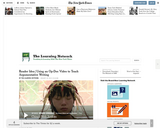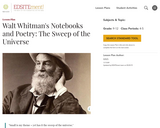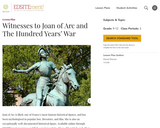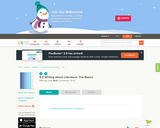
Tips and tools to help students write argumentative writing.
- Subject:
- English Language Arts
- Material Type:
- Reading
- Provider:
- University of Chapel Hill North Carolina Writing Center
- Author:
- UNC Writing Center
- Date Added:
- 02/26/2019

Tips and tools to help students write argumentative writing.

In this lesson, students watch an Op-Doc and note how the filmmakers build their argument.

In this lesson, students will analyze the rhetorical strategies Malcolm X used in his speeches, such as tone, emotional appeal, and descriptive language. They will also consider the strategies used by African American leaders during the Civil Rights Movement and the social implications of these strategies, contrasting the leadership and ideology of Martin Luther King, Jr. and Malcolm X in the Civil Rights Movement and evaluate their legacies. They will identify personal values and use them to determine appropriate behaviors for protecting their individual rights.

In this lesson, students will generate questions about what has happened to the environment and the people of Fukushima as a result of the tsunami and flooding of the nuclear power plant. Students will use primary source video testimony and interviews to gather information from many perspectives, share information orally, and take notes on ideas expressed by others. Then, students will integrate information on Fukushima into an opinion paper.

Clues to Walt Whitman's effort to create a new and distinctly American form of verse may be found in his Notebooks, now available online from the American Memory Collection. In an entry to be examined in this lesson, Whitman indicated that he wanted his poetry to explore important ideas of a universal scope (as in the European tradition), but in authentic American situations and settings using specific details with direct appeal to the senses.

Students engage in a Structure Academic Controversy (SAC) about the "War Powers Act", "The War Powers Resolution: After Thirty-Six Years", and "The Constitutional Limitations on the President's Powers" to answer the essential question, "Did the creation of the War Powers Act conflict with Congress's Constitutional power to declare war?"

This inquiry is focused on the compelling question "Was American expansion abroad justified?" The inquiry calls into question motives and outcomes of imperialism by considering both the positive and negative results of United States expansion abroad, with specific focus on the United States' involvement in the Spanish-American War.

Students explore personal feelings about civil liberties, research the history of sedition-related legislation in the United States and create an informed position paper on the concept of sedition.

Students trace Joan of Arc's history from childhood, through her death, and on to her nullification trial. Reading the words of laborers, pages, knights and clerics, students gain authentic historical context for a charismatic and complicated figure and better understand Joan's place in the history of the Hundred Years' War.

This chapter introduces students to the basics of reading literature. It introduces students to subjective and objective reading, and goes over the basic ideas behind reading for plot, character, setting, and theme. Learning objectives are: Ask subjective and objective questions about what they have read; Learn the meanings of “tone,†“diction,†and “syntax.â€; Identify the major elements of a plot; Identify character, setting, and theme; Differentiate between internal and external conflict.

This lesson examines Charlotte Perkin Gilman's "The Yellow Wallpaer" through critcal reading and analysis of the short story. Students will also use text-dependent questions to write a reflective, thematic essay.